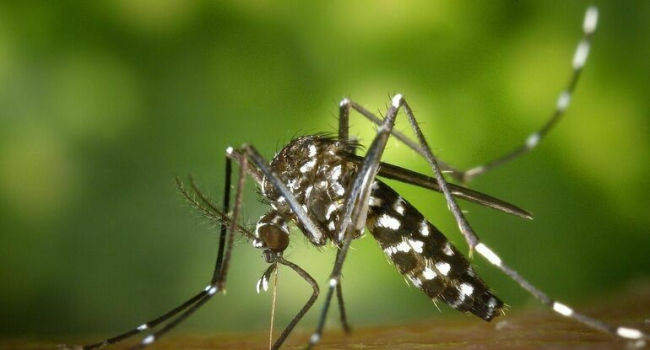- Latest news▼
-
13:58, June 26 Armenia addiction treatment national center director: 210 patients with drug addiction received treatment in 2023

-
08:42, June 26 Multiple brands of ice cream recalled in US due to listeria fears

-
19:31, June 25 MedXpress: pain medications increase sensitivity to sunlight

-
15:09, June 25 World Health Organization reports more than 3,100 cases of mpox worldwide

-
08:38, June 25 Experts discover why some people don't get infected with COVID-19

-
23:22, June 24 Foods that effectively lower blood sugar level are revealed

-
08:36, June 24 Researchers uncover hidden DNA mechanisms of rare genetic diseases

-
08:49, June 22 Research confirms link between snoring and hypertension

-
00:22, June 21 Researchers find out which group of people is genetically prone to obesity

-
19:20, June 20 Existing high blood pressure drugs may prevent epilepsy - study

-
17:24, June 20 Biology Methods & Protocols: Artificial intelligence will soon be able to detect cancer

-
11:27, June 20 Fetal hypoxia and maternal stress can lead to nicotine dependence

-
08:39, June 20 Is coffee addiction ‘hereditary?’

-
01:38, June 20 Scientists found a stronger immune response to influenza in people who were infected as children

-
22:50, June 19 Deadly bacterial infection is spreading across Japan

All materials
ECDC: Cases of dengue fever and other mosquito-borne diseases have increased in Europe

Cases of dengue fever and other mosquito-borne diseases are rising significantly in Europe as climate change creates warmer conditions conducive to the spread of invasive mosquitoes, the EU health agency warned on Tuesday.
In 2023, 130 locally acquired dengue cases will be reported in the region, which includes the European Union (EU) as well as Iceland, Liechtenstein and Norway (EEA), up from 71 in 2022, AFP wrote.
This is a “significant increase” compared to the 2010-2021 period, when the number of cases for the entire period was 73, the Stockholm-based European Center for Disease Prevention and Control (ECDC) said.
The number of imported cases is also rising, with 1,572 cases in 2022 and 4,900 in 2023, the “highest number” since EU monitoring began in 2008.
“Europe is already seeing how climate change is creating more favorable conditions for invasive mosquitoes to spread into previously unaffected areas and infect more people with diseases such as dengue,” said ECDC Director Andrea Ammon.
“We see that there is a link between warmer temperatures in the summer, milder winters and the spread of mosquitoes in areas where they are now absent,” Ammon said at a news conference.
Regarding West Nile virus, 713 cases of local infection and 67 deaths were reported in 123 different regions of nine EU countries in 2023.
Although the number of cases decreased from 1,133 in 2022, the number of affected regions was the highest since 2018.
The mosquito responsible for the spread of West Nile virus, Culex pipiens, is native to Europe and is widespread throughout the EU/EEA, the ECDC said.
The Aedes aegypti species, responsible for the spread of yellow fever, dengue fever, chikungunya and Zika, has recently settled in Cyprus and some remote regions of the EU, such as Madeira and the French Caribbean islands, experts said.
“Climate change is widely expected to significantly affect the spread of mosquito-borne diseases in Europe, for example by creating environmental conditions favorable for the establishment and growth of mosquito populations,” the ECDC said.
According to the agency, developing coordinated measures such as insecticide nets and indoor spraying, as well as simple measures such as removing stagnant water from balconies and gardens, and personal protection measures to reduce the risk of mosquito bites, is crucial to control mosquito-borne diseases.
Follow NEWS.am Medicine on Facebook and Twitter
- Most read
month
week
day
- Is coffee addiction ‘hereditary?’ 1727
- Existing high blood pressure drugs may prevent epilepsy - study 1426
- Fetal hypoxia and maternal stress can lead to nicotine dependence 1381
- Researchers find out which group of people is genetically prone to obesity 1351
- Biology Methods & Protocols: Artificial intelligence will soon be able to detect cancer 1326
- Scientists found a stronger immune response to influenza in people who were infected as children 1320
- Research confirms link between snoring and hypertension 789
- Researchers uncover hidden DNA mechanisms of rare genetic diseases 692
- Experts discover why some people don't get infected with COVID-19 597
- World Health Organization reports more than 3,100 cases of mpox worldwide 540
- Foods that effectively lower blood sugar level are revealed 529
- MedXpress: pain medications increase sensitivity to sunlight 410
- Armenia addiction treatment national center director: 210 patients with drug addiction received treatment in 2023 279
- Multiple brands of ice cream recalled in US due to listeria fears 248
- Find us on Facebook
- Poll





